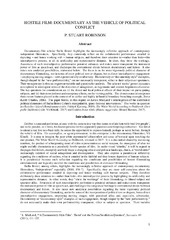Hostile Film: Documentary as The Vehicle of Political Conflict
Forfatter
Robinson, P. StuartSammendrag
Documentary-film scholar Stella Bruzzi highlights the increasingly reflexive approach of contemporary independent filmmakers. Specifically, they commonly reflect on the collaborative performance entailed in depicting – and hence working with – human subjects, and therefore draw attention to—rather than hide—this intersubjective process, in all its artificiality and representative distance. In short, they show the workings. Awareness of such intersubjective performative potential enhances and makes more transparent the immanent power of film as speech-act, and challenges the conventional divide between documentary and fiction. It also raises new analytical possibilities, elaborated below. The focus is on the more vigorously political character of documentary filmmaking, not in terms of overt political text or slogans, but as direct intersubjective engagement – employing moving images – with a perceived ally or adversary. Documentary or “documentary style” examples, though shaped by the “new performativity,” are not necessarily transparent, either to their subjects or spectators. Their transparency is thus an important variable and question for analysis. The selected works’ power-dynamics are explored in ideological terms of the dialectics of antagonism, as hegemonic and counter-hegemonic discourse. The key questions for consideration are (i) the direct and local political effects of their impact on participating subjects, and (ii) their more indirect and exemplary effects, on the viewing public. The chosen material comprises three recent features placed in the context of an earlier and highly influential boundary-breaching example, Borat (Larry Charles, 2006). The paper builds, in this regard, on Lewis MacLeod’s interrogation of the ambivalent political dimension of Sacha Baron Cohen’s manipulative, quasi-fictional interventions. The works in question are Reindeer Island (Reindrømmen) (dir. Fridtjof Kjæreng, 2019), The White World According to Daliborek (Svet podle Daliborka) (dir. Vít Klusák, 2017) and Golden Dawn Girls (Hatets vugge) (dir. Håvard Bustnes, 2017).
Forlag
Cambridge Scholars PublishingSitering
Robinson PS: Hostile Film: Documentary as The Vehicle of Political Conflict. In: Uzunoglu S, Baybars, Yilmaz. Discourses and Practices of Othering: Politics, Policy Making, and Media, 2023. Cambridge Scholars Publishing p. 142-163Metadata
Vis full innførselSamlinger
Copyright 2023 The Author(s)


 English
English norsk
norsk